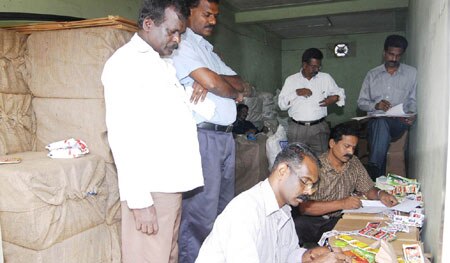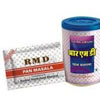The Food Safety and Standards Act has not only raised apprehensions among those in the food business, but also the Punjab government which too seems concerned about more powers that would be vested in the implementing authorities. Punjab health minister Madan Mohan Mittal on Saturdaysaid though the Act would benefit the masses by ensuring the safety of food, he said it might give rise to a system of 'Inspector Raj'. However, he assured that the government would take the necessary steps to avoid such a problem. The health minister was in Ludhiana to attend a seminar on the Food Safety and Standards Act. The seminar was aimed at spreading awareness about the Act among the masses.Under the Act, all food-serving units will be required to get permission from the health department. Units with sales above Rs. 12 lakh per year will need to get licences, while others will only have to get registration. "The Food Safety and Standards Act will be very helpful in maintaining a system that will ensure safety of food. For that, the people involved in the food industry will have to get registered or acquire a license, according to the provisions of the Act." However, he added, "Since there are lot of people involved in the industry, including those with tiny businesses, we feel there is scope of 'Inspector Raj'. But we will design a proper system to keep a regular check on all the officials, to eliminate that possibility."
The Act has already created trepidation among the people associated with the food industry. Harjit Singh, president, Bakery Association Ludhiana, said, "This law is suitable for big business units. Small units like ours can never fulfil the norms of the Act. The Act does not even allow us to use water that is not passed as hygienic. Now, if the municipal corporation's water also does not pass the hygiene test, how will we use this water? The Act will only give more powers to inspectors and will certainly create 'Inspector Raj'." In fact, worried about the provisions of the Act, the sweet makers have submitted a memorandum to the health minister.
Narinder Pal Singh, president, Punjab Halwai Association, said, "We have submitted a long list of demands regarding the Food Safety and Standards Act. There are provisions in the Act, which need to be revised. For instance, the Act directs us to get a water-testing certificate. Now, a certificate for both bacterial and chemical testing from private labs cost us around Rs. 4,500 with six months' validity. Therefore, we should be exempted from the mandatory water analysis."
Department does not have manpower to give licences
According to the Food Safety and Standards Act, all food-serving units from a top hotel to a small tea stall will have to get registration or licence from the heath department. However, at present the health department does not even have the infrastructure to get the registration and licensing done.
Speaking on condition of anonymity, an official from the health department said, "In Ludhiana district alone, there will be more than 5,000 licences and around 1 lakh registrations required. But the health department is short of staff and people are coming to get licences are already getting harassed."
When Punjab health minister Madan Mohan Mittal was asked on Saturday about the workforce required to get the licensing and registration done, he said, "It will take time. We will have a separate wing for those purposes and we will solve the problem of staff shortage." Till now, the health department has issued 834 licences and completed 1,375 registrations under the Food Safety and Standards Act across the state.













 തിരുവനന്തപുരം: പാന്മസാല നിരോധനത്തിനെതിരെ വ്യാപാരികള് നല്കിയ ഹര്ജിയില് സര്ക്കാര് തിങ്കളാഴ്ച വീണ്ടും സത്യവാങ്മൂലം നല്കും. ഇക്കാര്യത്തില് ഇതുവരെ സ്വീകരിച്ച നടപടി വ്യക്തമാക്കിക്കൊണ്ടുള്ള സത്യവാങ്മൂലമാകും ഹൈക്കോടതിയില് സമര്പ്പിക്കുക. കേസ് ഈ മാസം 14 ന് വീണ്ടും വാദം കേള്ക്കാനിരിക്കുകയാണ്. ഭക്ഷ്യ സുരക്ഷാ നിയമപ്രകാരം അനുവദനീയ പാന്മസാലയും ഗുഡ്കയുമല്ല സംസ്ഥാനത്ത് വിറ്റിരുന്നതെന്നാണ് സര്ക്കാര് വാദിക്കുക. അതേസമയം അന്യസംസ്ഥാനങ്ങളില് നിന്ന് അനധികൃതമായി പാന്മസാല വന്തോതില് എത്തിക്കുന്നുവെന്ന വിവരത്തെത്തുടര്ന്ന് ജാഗ്രത പുലര്ത്താന് ചെക്പോസ്റ്റുകളില് സര്ക്കാര് നിര്ദേശം നല്കിയിട്ടുണ്ട്. സംസ്ഥാനത്ത് അവശേഷിക്കുന്ന പാന്മസാല പുറത്തേക്ക് കൊണ്ടുപോകാന് മാത്രമാണ് സര്ക്കാര് അനുമതി നല്കിയിട്ടുള്ളത്. 15 ന് അതിനുള്ള സമയം അവസാനിക്കും. എന്നാല് ട്രെയിനിലും സ്വകാര്യ വാഹനങ്ങളിലും ബസ്സുകളിലും പാന്മസാല എത്തിക്കുന്നതായാണ് വിവരം. പ്രധാനമായും അന്യ സംസ്ഥാനത്തൊഴിലാളികളെ ലക്ഷ്യമിട്ടാണ് പാന്മസാല എത്തിക്കുന്നത്. ഇതിനായി ഇടനിലക്കാരും പ്രവര്ത്തിക്കുന്നുണ്ട്. അന്യസംസ്ഥാന തൊഴിലാളികള് തിങ്ങിപ്പാര്ക്കുന്ന സ്ഥലങ്ങളുംനഗരങ്ങളിലെ ചില കേന്ദ്രങ്ങളും അധികൃതരുടെ നിരീക്ഷണത്തിലാണ്. ഭക്ഷ്യ സുരക്ഷാ കമ്മീഷണറുടെ കീഴിലുള്ള മൊബൈല് വിജിലന്സ് സ്ക്വാഡിനോട് അവധി ദിവസങ്ങളിലും പരിശോധന നടത്താന് നിര്ദേശിച്ചിട്ടുണ്ട്. മെയ് 22 നാണ് പാന്മസാല നിരോധിച്ച് സര്ക്കാര് ഉത്തരവിറക്കിയത്. മായം ചേര്ത്ത ഭക്ഷ്യവസ്തുക്കളുടെ വില്പന നിരോധന നിയമപ്രകാരമാണ് ഇവ നിരോധിച്ചിട്ടുള്ളത്. വായിലെ കാന്സര് അടക്കമുള്ള മാരകരോഗങ്ങള്ക്ക് പുകയില അടങ്ങിയ പാന്മസാലയും ഗുഡ്കയും കാരണമാകുന്നതായും ആരോഗ്യ രംഗത്തെ വിവിധ സംഘടനകള് വ്യക്തമാക്കിയിട്ടുണ്ട്. ഇക്കാര്യം സര്ക്കാര് ഹൈക്കോടതിയെ അറിയിച്ചിട്ടുണ്ട്. സംസ്ഥാനത്ത് 500 മുതല് 1000 കോടി രൂപയുടെ വരെ പാന്മസാല വില്ക്കപ്പെടുന്നതായാണ് സര്ക്കാരിന്റെ നിഗമനം. നിരോധത്തിനെതിരെ ഓള് കേരള ടുബാക്കോ ഡീലേഴ്സ് അസോസിയേഷന്, ഗോദാവത് പാന്മസാല ഡീലേഴ്സ് അസോസിയേഷന് എന്നിവയാണ് കോടതിയെ സമീപിച്ചിട്ടുള്ളത്.
തിരുവനന്തപുരം: പാന്മസാല നിരോധനത്തിനെതിരെ വ്യാപാരികള് നല്കിയ ഹര്ജിയില് സര്ക്കാര് തിങ്കളാഴ്ച വീണ്ടും സത്യവാങ്മൂലം നല്കും. ഇക്കാര്യത്തില് ഇതുവരെ സ്വീകരിച്ച നടപടി വ്യക്തമാക്കിക്കൊണ്ടുള്ള സത്യവാങ്മൂലമാകും ഹൈക്കോടതിയില് സമര്പ്പിക്കുക. കേസ് ഈ മാസം 14 ന് വീണ്ടും വാദം കേള്ക്കാനിരിക്കുകയാണ്. ഭക്ഷ്യ സുരക്ഷാ നിയമപ്രകാരം അനുവദനീയ പാന്മസാലയും ഗുഡ്കയുമല്ല സംസ്ഥാനത്ത് വിറ്റിരുന്നതെന്നാണ് സര്ക്കാര് വാദിക്കുക. അതേസമയം അന്യസംസ്ഥാനങ്ങളില് നിന്ന് അനധികൃതമായി പാന്മസാല വന്തോതില് എത്തിക്കുന്നുവെന്ന വിവരത്തെത്തുടര്ന്ന് ജാഗ്രത പുലര്ത്താന് ചെക്പോസ്റ്റുകളില് സര്ക്കാര് നിര്ദേശം നല്കിയിട്ടുണ്ട്. സംസ്ഥാനത്ത് അവശേഷിക്കുന്ന പാന്മസാല പുറത്തേക്ക് കൊണ്ടുപോകാന് മാത്രമാണ് സര്ക്കാര് അനുമതി നല്കിയിട്ടുള്ളത്. 15 ന് അതിനുള്ള സമയം അവസാനിക്കും. എന്നാല് ട്രെയിനിലും സ്വകാര്യ വാഹനങ്ങളിലും ബസ്സുകളിലും പാന്മസാല എത്തിക്കുന്നതായാണ് വിവരം. പ്രധാനമായും അന്യ സംസ്ഥാനത്തൊഴിലാളികളെ ലക്ഷ്യമിട്ടാണ് പാന്മസാല എത്തിക്കുന്നത്. ഇതിനായി ഇടനിലക്കാരും പ്രവര്ത്തിക്കുന്നുണ്ട്. അന്യസംസ്ഥാന തൊഴിലാളികള് തിങ്ങിപ്പാര്ക്കുന്ന സ്ഥലങ്ങളുംനഗരങ്ങളിലെ ചില കേന്ദ്രങ്ങളും അധികൃതരുടെ നിരീക്ഷണത്തിലാണ്. ഭക്ഷ്യ സുരക്ഷാ കമ്മീഷണറുടെ കീഴിലുള്ള മൊബൈല് വിജിലന്സ് സ്ക്വാഡിനോട് അവധി ദിവസങ്ങളിലും പരിശോധന നടത്താന് നിര്ദേശിച്ചിട്ടുണ്ട്. മെയ് 22 നാണ് പാന്മസാല നിരോധിച്ച് സര്ക്കാര് ഉത്തരവിറക്കിയത്. മായം ചേര്ത്ത ഭക്ഷ്യവസ്തുക്കളുടെ വില്പന നിരോധന നിയമപ്രകാരമാണ് ഇവ നിരോധിച്ചിട്ടുള്ളത്. വായിലെ കാന്സര് അടക്കമുള്ള മാരകരോഗങ്ങള്ക്ക് പുകയില അടങ്ങിയ പാന്മസാലയും ഗുഡ്കയും കാരണമാകുന്നതായും ആരോഗ്യ രംഗത്തെ വിവിധ സംഘടനകള് വ്യക്തമാക്കിയിട്ടുണ്ട്. ഇക്കാര്യം സര്ക്കാര് ഹൈക്കോടതിയെ അറിയിച്ചിട്ടുണ്ട്. സംസ്ഥാനത്ത് 500 മുതല് 1000 കോടി രൂപയുടെ വരെ പാന്മസാല വില്ക്കപ്പെടുന്നതായാണ് സര്ക്കാരിന്റെ നിഗമനം. നിരോധത്തിനെതിരെ ഓള് കേരള ടുബാക്കോ ഡീലേഴ്സ് അസോസിയേഷന്, ഗോദാവത് പാന്മസാല ഡീലേഴ്സ് അസോസിയേഷന് എന്നിവയാണ് കോടതിയെ സമീപിച്ചിട്ടുള്ളത്. 




